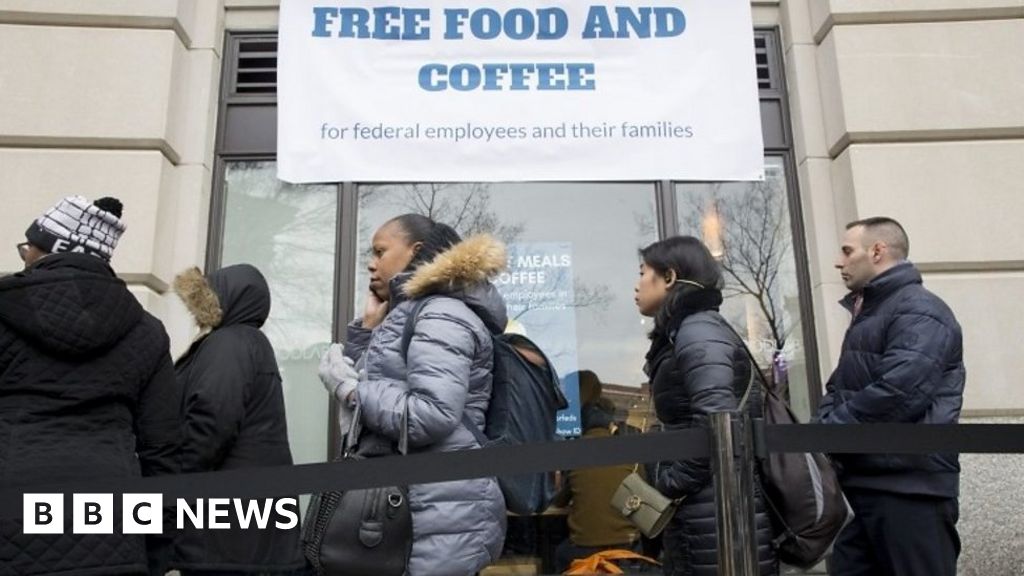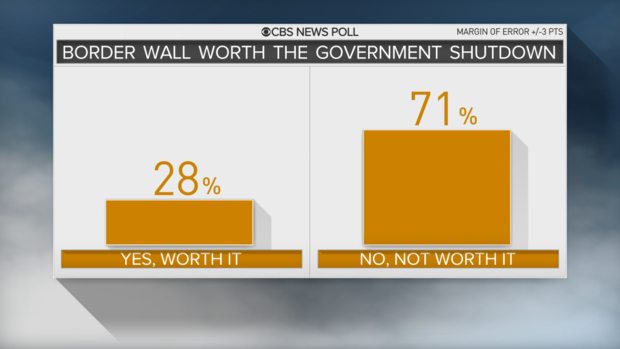Friday night, Trump released his 800,000 hostages without getting anything for them. Zero. He signed exactly the same deal that was on the table back in December: Keep the government funded at its previous level for a few weeks while an immigration/border-security compromise gets negotiated.
The fact that it came out that way is extremely important. Giving him anything, even just the “pro-rated down payment on the Wall” he had demanded on Thursday, would invite regular government shutdowns for the rest of his term. Every time some budget bill needed to be signed, Trump could say, “No. I want more or I’ll shut down the government again.”
By holding the line until things really started to get bad, Speaker Pelosi stood by the important principle of not paying ransom. If Trump wants something from the Democrats, he can offer them something positive in exchange. (That’s how politics is supposed to work in America.) But he’s not going to get concessions just by threatening to hurt people or hurt the country.
Why now? If the same deal has been available since Day Zero, why did it happen on Day 35? There were two precipitating causes: the test votes the Senate held on Thursday, which showed Republican unity beginning to crack, and the 82-minute ground stop Friday morning at New York’s LaGuardia Airport due to air traffic controllers not coming in to keep working without pay, which caused delays that rippled across the country. This was widely interpreted (correctly, I think) as a warning sign from a system about to break down.
The Senate voted on two proposals Thursday, and neither got the 60 votes necessary to proceed. But Trump’s preferred outcome ($5.7 for the Wall, plus other restrictions on immigration and asylum) got 50 votes, with one Democratic crossover (Joe Manchin of West Virginia), while the Democrats’ proposal (open the government temporarily without additional provisions) got 52 votes, with six Republican crossovers: Lamar Alexander (Tenn.), Susan Collins (Maine), Cory Gardner (Colo.), Johnny Isakson (Ga.), Lisa Murkowski (Alaska), and Mitt Romney (Utah). (And at least a few of the Republicans who stuck by Trump were not happy.) According to the Washington Post, this outcome surprised Trump, because Jared Kushner had assured him that Democrats were about to start defecting.
But pointing to the Senate as a cause just shifts the question to another level: Why Day 35? Why did Mitch McConnell finally allow the Senate to vote on something, and why did Republican senators start to break ranks?
The LaGuardia ground stop was part of a nationwide pattern: As government workers faced losing a second paycheck, warning lights were flashing and systems were beginning to fail.
The FBI Agents Association put out a report listing the effects the shutdown was having on law enforcement. Perhaps the most egregious example: The FBI agents investigating the MS-13 gang (that Trump so often features in his anti-immigrant speeches demanding a wall) were unable to pay a translator to communicate with their informants. The Commandant of the Coast Guard tweeted:
I find it unacceptable that
@USCG members must rely on food pantries & donations to get through day-to-day life.
What made this growing pressure worse for Republicans was the repeated insensitivity and tone-deafness expressed by plutocratic Trump administration officials, who are clueless about the half the country that lives paycheck-to-paycheck. Chief economic advisor Larry Kudlow described federal employees forced to choose between working without pay and losing their jobs as “volunteers”. Commerce Secretary Wilbur Ross couldn’t understand why federal workers would go to food banks when they could take out loans. And Trump himself spun Ross’ comment into a fantasy about compassionate grocers who “know the people, they been dealing with them for years, and they work along.” Perhaps extrapolating from his own experience owing hundreds of millions to Deutsche Bank, he claimed that banks too would “work along” with missed mortgage payments.
As a result, polls were turning against Republicans. Trump’s approval rating dropped from 42.2% at the beginning of the shutdown to 39.3% by the end. Polls consistently showed that the public blamed either Trump or congressional Republicans for the shutdown, and believed that getting Trump’s Wall funded was not worth shutting down the government.
Now what? The spending bill just lasts for three weeks, at which point the whole standoff could start again. In an effort to claim he hadn’t lost to Pelosi, Trump threatened as much:
This was in no way a concession. It was taking care of millions of people who were getting badly hurt by the Shutdown with the understanding that in 21 days, if no deal is done, it’s off to the races!
But it’s hard to see Republicans in Congress standing by him for another shutdown. Mitch McConnell didn’t want this shutdown and certainly doesn’t want another one. (He is fond of saying, “There’s no education in the second kick of a mule.”) And ultimately, he holds the high card over Trump: If he works out a deal with Democrats and Trump vetoes it, McConnell could sway enough Republicans to override that veto. The thought of 2/3rds of the Senate voting against him on anything should be terrifying to a president who could well face impeachment before the end of his term.
So what will happen in the next three weeks? Ezra Klein lays out four possibilities:
- A grand bargain on immigration takes the issue off the table for the near future.
- Pelosi, Schumer, and McConnell reach no deal and the government shuts down again.
- No immigration/wall deal, but there’s no shutdown, and Trump seeks to build his Wall without Congress by declaring a national emergency.
- No immigration/wall deal, but no national emergency.
I foresee a lesser bargain, similar to what Lindsey Graham and Dick Durbin have already worked out: Democrats have already signaled that they’re willing to offer more money for border security, but they think the Great Wall of Trump is a stupid waste. (Not that it matters, but reality is on their side here; the Wall is a stupid waste. Republicans know this, which is why they didn’t fund it when they had the majority in both houses.) A number of Republicans (including even Trump, at times) have said they don’t want to deport the DACA people, whose cause gets a lot of sympathy from Americans in general.
The question is how much funding for how much DACA protection. Here, I think the failure of the shutdown pushes the needle towards Democrats. This is what I picture:
- DACA recipients get permanent legal status, with a path to citizenship left vague. Democrats can promise to eventually get them citizenship, while Republicans can deny this will ever happen.
- Border security gets the $5.7 billion Trump was asking for, but mostly for technology at ports of entry and more immigration judges.
- Rules for legal immigration change a bit, but Congress reaffirms support for the United States’ treaty obligations under the Convention Relating to the Status of Refugees, which Trump has been ignoring.
- Some small number of additional barriers on the border are authorized, which Democrats will be able to claim is not Trump’s Wall, but Republicans can claim is a step toward Trump’s Wall.
Finally, I hope Democrats insist that a study be done to produce something that until now has never existed: an actual design for a sea-to-sea border wall, with a realistic cost estimate and expert estimates of its effects on illegal immigration, drug smuggling, violent crime, and the environment. The era of wild claims has to end.
Trump may or may not try to build his wall without Congress by declaring a national emergency, but I doubt it will get him anywhere. (Truman wasn’t able to seize the steel industry, and that was during wartime.) Whatever he wants that declaration to accomplish will be tied up in court for the rest of his term. The point of declaring a national emergency, I believe, is mainly to con Trump’s base into thinking that he didn’t really lose.
While I don’t think it will be effective in building a wall, declaring a bogus emergency breaks another norm that protects democracy. Down the road, it could cost us dearly: A leader’s abuse of emergency powers is a common way for democracies to become autocracies.




Trackbacks
[…] week’s featured posts are “The End of the Shutdown” and “Extortion Tactics Have No Place in American […]
[…] Sift: The End of the Shutdown and Extortion Tactics Have No Place in American […]